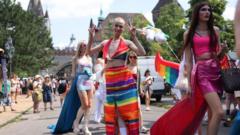Will Budapest Pride March Defy Police Orders? Mayor Promises It Will Happen!

Overview of Budapest's Controversial Pride March Ban
The annual Budapest Pride march, a vibrant celebration of LGBTQ+ rights, has become a focal point for contention in Hungary. In June 2023, the police announced a ban on this much-anticipated event, which has sparked a defiant response from liberal Mayor Gergely Karacsony. Amidst this unfolding drama, tensions between Hungary's nationalist government and the LGBTQ+ community have reached a boiling point. This article dives deep into the events leading up to the ban, the legal implications, and the potential impact on the LGBTQ+ community in Hungary.
Background of the Budapest Pride March
Budapest Pride has been a significant event in Hungary, drawing tens of thousands of participants from both local and international communities. The march serves not only as a celebration but also as a vital platform for advocating LGBTQ+ rights in a country where such issues remain contentious.
The Rise of Nationalism in Hungary
In recent years, Hungary has seen a rise in nationalist sentiment, largely propelled by Prime Minister Viktor Orban and his Fidesz party. This shift has resulted in the implementation of laws that many view as hostile toward the LGBTQ+ community. The culmination of these efforts has led to the current situation surrounding Budapest Pride.
Legal Framework Impacting Pride
In 2021, Hungary enacted a Child Protection Law aimed at restricting discussions around homosexuality in public spaces. This law has been interpreted by authorities as a means to limit gatherings that promote LGBTQ+ rights, framing them as harmful to children. This legal backdrop has created an environment of fear and uncertainty for LGBTQ+ activists and their supporters.
The Police Ban: A Controversial Decision
The police ban on the Pride march has escalated tensions in Budapest, with Mayor Karacsony vowing to proceed with the event under the banner of a "Day of Freedom." This defiance is rooted in his belief that the police do not have the authority to restrict freedom of assembly, a fundamental democratic right.
Mayor Gergely Karacsony's Response
In a vigorous statement, Mayor Karacsony declared, “Budapest city hall will organise the Budapest Pride march as a local event on 28 June, Period.” His determination reflects a broader struggle for LGBTQ+ rights and inclusivity in Hungary. The mayor's social media post likened the police ban to an attempt to "ban a procession of unicorns," illustrating his view that such restrictions are absurd and unjustified.
Government Justifications for the Ban
The government, represented by Fidesz communications chief Tamas Menczer, insists that the new laws prioritize the "protection of children." He argues that Pride does not align with freedom of expression or assembly but is merely a festival showcasing a specific sexual community, which should not be exposed to minors. This rhetoric has raised concerns about the potential for increased discrimination and marginalization of the LGBTQ+ community.
Facial Recognition and Fines
Under the new legal framework, police have the ability to use facial recognition software to identify participants in gatherings deemed illegal. Those identified could face fines ranging from £14 to £420, creating an additional layer of intimidation for individuals considering attending the march.
Legal Battles and Court Rulings
Despite the police ban, the Rainbow Mission foundation, alongside various human rights organizations, has launched a series of events on the same day, aiming to maintain solidarity with Pride. Several court rulings have already sided with these organizations, granting them the right to gather despite police objections.
Strategies for Participation
Human rights groups such as the Hungarian Helsinki Committee (HHC) have provided guidance for those planning to participate on 28 June. Their recommendations include:
- Refusing to pay any on-the-spot fines imposed by the police.
- Requesting an in-person right of appeal for any notifications received by post.
- Participating in large numbers to create logistical challenges for law enforcement, potentially reducing the likelihood of police intervention.
What to Expect on 28 June
The central event, branded as a "Day of Freedom," is expected to draw significant participation. However, there are uncertainties surrounding the nature of the event and how it will unfold given the police's stance. The mayor has emphasized that the gathering will not include elements typically associated with Pride, such as trucks, dancers, or overt expressions of sexuality, seeking to navigate the legal constraints imposed by authorities.
The Role of the Community
The success of the Day of Freedom hinges on community involvement. Activists believe that a robust turnout could send a powerful message of solidarity and resilience in the face of oppression. It could also serve as a critical moment for the LGBTQ+ community to assert their rights in a country where acceptance remains precarious.
Conclusion: A Defining Moment for LGBTQ+ Rights in Hungary
The events surrounding this year's Budapest Pride march encapsulate the ongoing struggle for LGBTQ+ rights in Hungary. As tensions escalate between the government and the community, the ability of citizens to gather peacefully and advocate for their rights hangs in the balance. Mayor Karacsony’s defiance against the police ban represents a critical moment in this struggle, echoing a broader call for freedom and equality.
As the world watches, the outcomes of the events on 28 June may set significant precedents for the future of LGBTQ+ rights in Hungary and beyond. Will the community's resilience pave the way for greater acceptance, or will the government's restrictive measures overshadow their efforts? The answer may lie in the streets of Budapest, as love and defiance collide in this pivotal moment.
FAQs
What is the significance of Budapest Pride?
Budapest Pride serves as a celebration of LGBTQ+ rights and a platform for advocacy, attracting participants from Hungary and around the world.
Why did the police ban the Pride march?
The police cited compliance with child protection laws and the potential for minors to witness the event as justification for the ban.
What are the consequences of participating in the march?
Participants could face fines if identified by police using facial recognition technology, but many activists encourage participation despite these risks.
How is the local government responding to the ban?
Mayor Gergely Karacsony has vowed to organize the event regardless of the police ban, framing it as a "Day of Freedom" and advocating for the community's right to assemble.
What strategies are human rights groups recommending?
Groups like the Hungarian Helsinki Committee advise participants to refuse fines, seek appeals, and attend in large numbers to demonstrate solidarity.
This Pride event is not just a celebration; it is a statement against oppression. Can courage and community overcome the barriers of discrimination? #BudapestPride #LGBTQRights #FreedomOfAssembly
Published: 2025-06-19 16:53:17 | Category: technology



